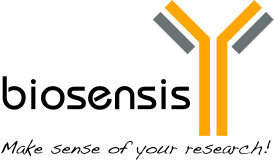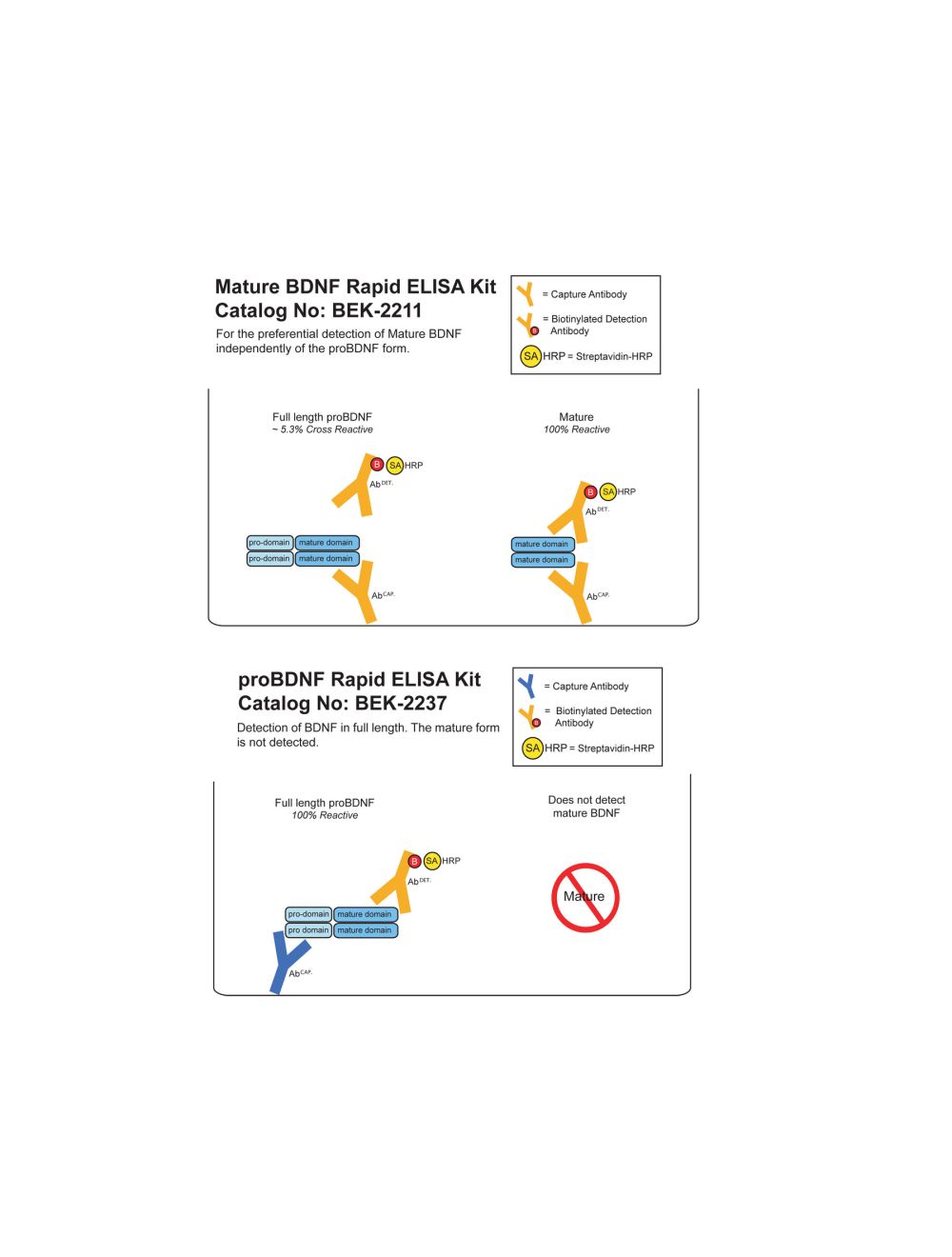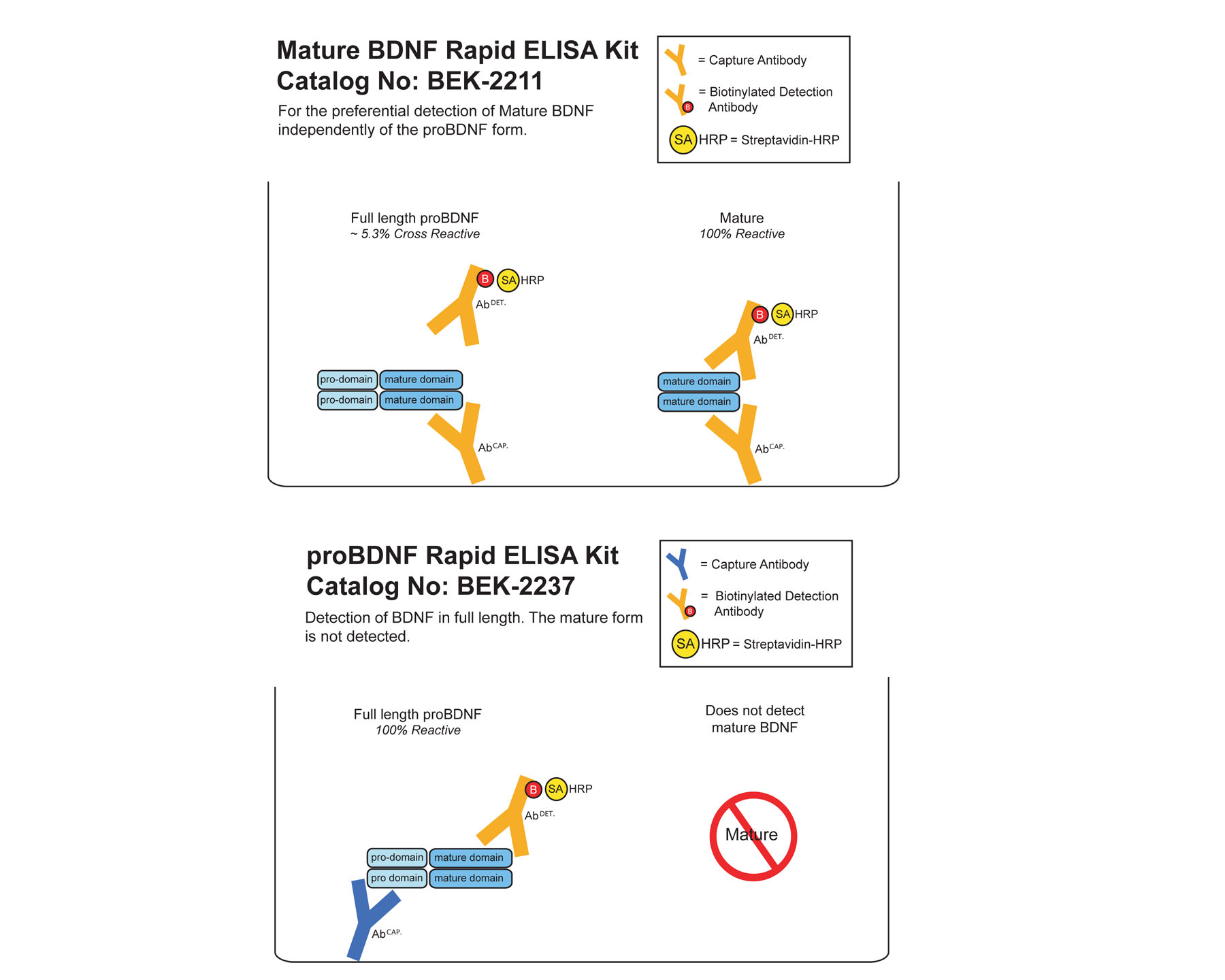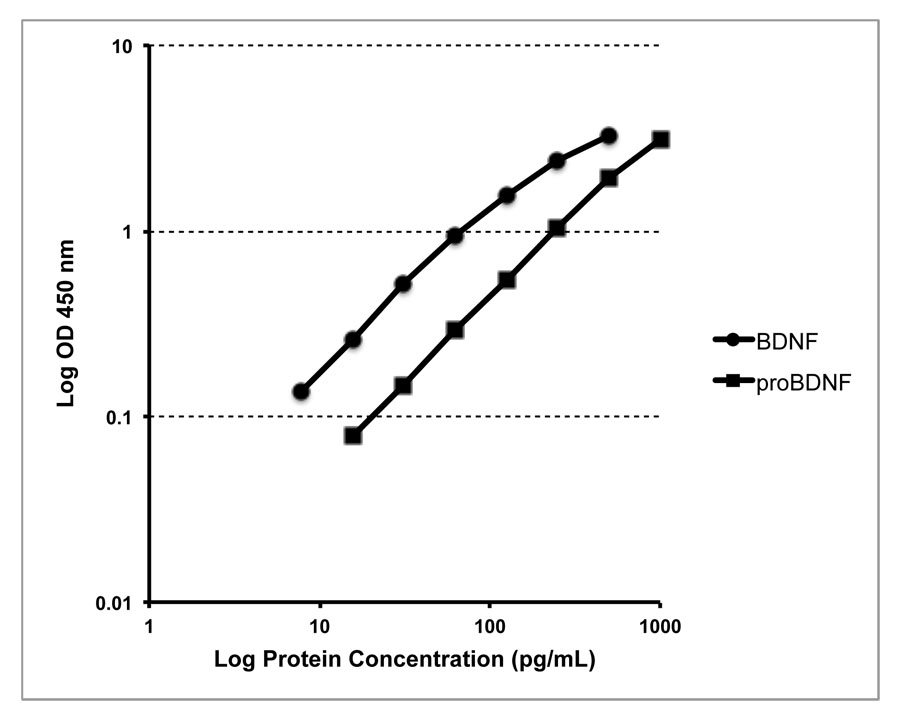Mature BDNF/proBDNF Combo (BEK-2211/2237), Human, Mouse, Rat, Rapid™ ELISA assay
As low as
US$647.00
Only %1 left
Catalog Number
BEK-2241
- Product Name Mature BDNF/proBDNF Combo (BEK-2211/2237), Human, Mouse, Rat, Rapid™ ELISA assay
-
Product Description
The Biosensis Mature BDNF/proBDNF Combo RapidTM enzyme-linked immunosorbent assay (ELISA) Kit combines individual, but complementary ELISA kits for the two most important BDNF isoforms: Mature BDNF (BEK-2211) and full-length proBDNF (BEK-2237). Both kits are sandwich ELISAs, useful for the quantification of mature BDNF and proBDNF in less than 4 hours in cell culture supernatants, serum, plasma (citrate and EDTA), mouse and rat cell lysates and rat brain extracts only if used as directed, with a simplified protocol and no loss of sensitivity or specificity. Please refer to the most current kit protocols for BEK-2211 (Mature BDNF RapidTM ELISA) and BEK-2237 (proBDNF RapidTM ELISA), for specific use instructions for each substrate application, in particular blood samples. BEK-2241 is the preferred Combo kit for human blood samples.
The Mature BDNF ELISA kit consists of a pre-coated mouse monoclonal anti-mature BDNF capture antibody, a biotinylated anti-mature BDNF detection antibody and horseradish peroxidase (HRP)-conjugated streptavidin. The proBDNF ELISA kit consists of a pre-coated monoclonal anti-proBDNF capture antibody, a biotinylated anti-mature BDNF detection antibody and horseradish peroxidase (HRP)-conjugated streptavidin. The addition of a substrate (3,3',5,5'-tetramethylbenzidine, TMB) yields a coloured reaction product which is directly proportional to the concentration of mature BDNF or proBDNF present in samples and protein standards. A BDNF and proBDNF positive control (QC sample) is provided to assure consistent assay performance. Both ELISA kits contain high quality protein calibrators. The Mature BDNF ELISA kit employs a recombinant E.coli-derived human mature BDNF standard approved by the World Health Organization (WHO, www.nibsc.org). The amino acid sequence of mature BDNF is identical for human, mouse, rat and a number of other species. This kit therefore is suitable to measure mature BDNF in all these species and uses the same antibodies and antigen. The proBDNF ELISA kit employs a recombinant mammalian, cleavage-resistant human proBDNF standard produced by Biosensis and validated against externally available proBDNF proteins. Due to a high degree of amino acid sequence homology, mouse and rat proBDNF can be quantified and expressed as human proBDNF equivalents. Internal Biosensis validation suggests that the use of the human standard provided in this kit will provide estimates that are identical, or close, to the actual levels of rat and mouse proBDNF present in rodent samples.
Note that accurate proBDNF quantification in human serum and citrate-plasma requires the addition of Heterophilic Antibody Blocker BL-004-500 provided in the kit, and available for purchase separately.
This ELISA kit has not been tested for other applications. It has been configured for research use only and is not to be used for diagnostic or clinical procedures. - Alternative Names Brain-derived neurotrophic factor; Abrineurin
- Application(s) ELISA
- Specificity Mature BDNF ELISA: Human, mouse, rat BDNF and numerous other species. Although the BDNF assay antibodies are raised against the mature domain, the mature BDNF ELISA preferentially detects mature BDNF over full-length proBDNF. proBDNF ELISA: Human, mouse and rat proBDNF. The capture antibody used in the proBDNF ELISA kit binds to epitopes within the pro-domain of proBDNF. Thus, this ELISA detects the full length and potentially truncated form of proBDNF, and does not quantify mature BDNF.
- Species Reactivity Human, Mouse, Rat
- Immunogen Description See BEK-2211 & BEK-2237 for specific details
- Range Mature BDNF: 7.8 - 500 pg/mL proBDNF: 15.6 - 1,000 pg/mL
- Sensitivity Typical limit of detection (LOD) for mature BDNF is less than 2 pg/mL, and 6 pg/mL for proBDNF determined as 150% of the blank value.
- Regulatory Status For research use only.
Product Info
-
Product Description
The Biosensis Mature BDNF/proBDNF Combo RapidTM enzyme-linked immunosorbent assay (ELISA) Kit combines individual, but complementary ELISA kits for the two most important BDNF isoforms: Mature BDNF (BEK-2211) and full-length proBDNF (BEK-2237). Both kits are sandwich ELISAs, useful for the quantification of mature BDNF and proBDNF in less than 4 hours in cell culture supernatants, serum, plasma (citrate and EDTA), mouse and rat cell lysates and rat brain extracts only if used as directed, with a simplified protocol and no loss of sensitivity or specificity. Please refer to the most current kit protocols for BEK-2211 (Mature BDNF RapidTM ELISA) and BEK-2237 (proBDNF RapidTM ELISA), for specific use instructions for each substrate application, in particular blood samples. BEK-2241 is the preferred Combo kit for human blood samples.
The Mature BDNF ELISA kit consists of a pre-coated mouse monoclonal anti-mature BDNF capture antibody, a biotinylated anti-mature BDNF detection antibody and horseradish peroxidase (HRP)-conjugated streptavidin. The proBDNF ELISA kit consists of a pre-coated monoclonal anti-proBDNF capture antibody, a biotinylated anti-mature BDNF detection antibody and horseradish peroxidase (HRP)-conjugated streptavidin. The addition of a substrate (3,3',5,5'-tetramethylbenzidine, TMB) yields a coloured reaction product which is directly proportional to the concentration of mature BDNF or proBDNF present in samples and protein standards. A BDNF and proBDNF positive control (QC sample) is provided to assure consistent assay performance. Both ELISA kits contain high quality protein calibrators. The Mature BDNF ELISA kit employs a recombinant E.coli-derived human mature BDNF standard approved by the World Health Organization (WHO, www.nibsc.org). The amino acid sequence of mature BDNF is identical for human, mouse, rat and a number of other species. This kit therefore is suitable to measure mature BDNF in all these species and uses the same antibodies and antigen. The proBDNF ELISA kit employs a recombinant mammalian, cleavage-resistant human proBDNF standard produced by Biosensis and validated against externally available proBDNF proteins. Due to a high degree of amino acid sequence homology, mouse and rat proBDNF can be quantified and expressed as human proBDNF equivalents. Internal Biosensis validation suggests that the use of the human standard provided in this kit will provide estimates that are identical, or close, to the actual levels of rat and mouse proBDNF present in rodent samples.
Note that accurate proBDNF quantification in human serum and citrate-plasma requires the addition of Heterophilic Antibody Blocker BL-004-500 provided in the kit, and available for purchase separately.
This ELISA kit has not been tested for other applications. It has been configured for research use only and is not to be used for diagnostic or clinical procedures. -
Related Products
Brain-derived neurotrophic factor, mature (BDNF, mature), Human, Mouse, Rat, Rapid™ ELISA assay
Brain-derived neurotrophic factor, pro- (proBDNF), Human, Mouse, Rat, Rapid™ ELISA assay
Mature BDNF/proBDNF Combo (BEK-2211/2217), Human, Mouse, Rat, Rapid™ ELISA assay
- Application(s) ELISA
- Application Details ELISA. For the quantification of Mature BDNF and proBDNF in Culture Supernatant, Serum, Plasma (Citrate), Plasma (EDTA), Cell Lysates, Tissue Homogenates. Please download the detailed product insert for complete instructions for the successful use of this ELISA. Use only as directed.
- Target Mature BDNF/proBDNF Combo (BEK-2211/2237)
- Specificity Mature BDNF ELISA: Human, mouse, rat BDNF and numerous other species. Although the BDNF assay antibodies are raised against the mature domain, the mature BDNF ELISA preferentially detects mature BDNF over full-length proBDNF. proBDNF ELISA: Human, mouse and rat proBDNF. The capture antibody used in the proBDNF ELISA kit binds to epitopes within the pro-domain of proBDNF. Thus, this ELISA detects the full length and potentially truncated form of proBDNF, and does not quantify mature BDNF.
-
Target Cross-Reactivity (ELISA)
Cross-reactivity of BDNF isoforms:
Mature BDNF ELISA:
No cross-reactivity is observed for nerve growth factor (NGF), neurotrophin-3 (NT-3), NT-4/5, glial cell line-derived neurotrophic factor (GDNF) and vascular endothelial growth factor (VEGF165) tested at 25 ng/mL in assay buffer. The reactivity of full-length proBDNF (0.125 ng/mL - 5 ng/mL) was determined in six independent assays using proBDNF proteins from four different sources (mammalian and bacterial, wild-type and mutated). The average cross-reactivity of proBDNF was found to be 5.3% +/- 0.5% in weight (w/v) concentration, or 12.1% +/- 1.2% in molar concentration (mean +/- SEM).
proBDNF ELISA:
Mature BDNF cross-reactivity was assessed by spiking 28 kDa mature BDNF protein obtained from WHO (www.nibsc.org) into a 1/5 diluted human serum sample at 5 ng/mL, which represents a BDNF concentration level of 25 ng/mL in undiluted, normal human serum. Cross-reactivity of mature BDNF was < 0.3% (w/v), or < 0.1% in molar concentration. The assay antibodies do not cross-react with nerve growth factor (NGF), neurotrophin-3 (NT-3) or NT-4/5. - Target Host Species Human
- Species Reactivity Human, Mouse, Rat
- Immunogen Description See BEK-2211 & BEK-2237 for specific details
- Range Mature BDNF: 7.8 - 500 pg/mL proBDNF: 15.6 - 1,000 pg/mL
- Sensitivity Typical limit of detection (LOD) for mature BDNF is less than 2 pg/mL, and 6 pg/mL for proBDNF determined as 150% of the blank value.
- Sample Type Cell Lysates, Culture Supernatant, Plasma (Citrate), Plasma (EDTA), Serum, Tissue Homogenates
- Detection Method Colorimetric
- Kit Components The ELISA kit box contains 2 x 96-well pre-coated strip plates per kit (1 x BDNF antibody, 1 x proBDNF antibody coated plate), protein standards, QC sample, detection reagents, heterophilic antibody blocker, wash and sample buffers, substrate buffer and detailed protocols.
- Storage Instructions Store at 2-8°C
- Storage Temperature 2-8°C
- Batch Number Please see item label.
- Expiration Date 12 months after date of receipt unopened.
- Alternative Names Brain-derived neurotrophic factor; Abrineurin
- Uniprot Number P23560
- Uniprot Number/Name P23560 (BDNF_HUMAN)
- Scientific Background BDNF belongs to the neurotrophin family and regulates the survival and differentiation of neurons during development. The alterations in BDNF expression induced by various kinds of brain insult including stress, ischemia, seizure activity and hypoglycemia, may contribute to some pathologies such as depression, epilepsy, Alzheimer's, and Parkinson's disease. FUNCTION: Promotes the survival of neuronal populations that are all located either in the central nervous system or directly connected to it. Major regulator of synaptic transmission and plasticity at adult synapses in many regions of the CNS. The versatility of BDNF is emphasized by its contribution to a range of adaptive neuronal responses including long-term potentiation (LTP), long-term depression (LTD), certain forms of short-term synaptic plasticity, as well as homeostatic regulation of intrinsic neuronal excitability. SUBUNIT: Monomers and homodimers. Binds to NTRK2/TRKB. SUBCELLULAR LOCATION: Secreted protein. Post Translation Modification (PTM): The propeptide is N-glycosylated and glycosulfated. PTM: Converted into mature BDNF by plasmin (PLG) (By similarity). DISEASE: Defects in BDNF are a cause of congenital central hypoventilation syndrome (CCHS); also known as congenital failure of autonomic control or Ondine curse. CCHS is a rare disorder characterized by abnormal control of respiration in the absence of neuromuscular or lung disease, or an identifiable brain stem lesion. A deficiency in autonomic control of respiration results in inadequate or negligible ventilatory and arousal responses to hypercapnia and hypoxemia. CCHS is frequently complicated with neurocristopathies such as Hirschsprung disease that occurs in about 16% of CCHS cases. SIMILARITY: Belongs to the NGF-beta family.
- Shipping Statement For order quantities larger than 1 plate, this product is supplied in package units of 2 plates.
- Shipping Temperature 2-8°C (on cold packs)
- UNSPSC CODE 41116158
- Regulatory Status For research use only.
Specifications
- Specific References Please refer to BEK-2211 (Mature BDNF RapidTM ELISA Kit) and BEK-2237 (proBDNF RapidTM ELISA Kit).

 1800 605-5127
1800 605-5127 +61 (0)8 8352 7711
+61 (0)8 8352 7711


